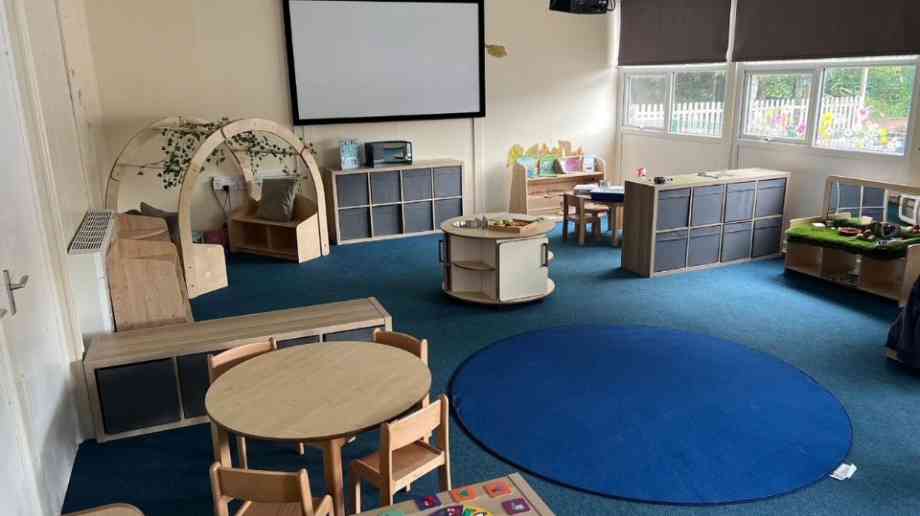
Building brighter beginnings
With thousands of new school-based nursery places created and more government funding on the way, we meet some of the schools that have taken up the offer – and find out what advice they would share
This September, 189 new or expanded school-based nurseries opened their doors across England, creating over 4,000 additional childcare places for children, thanks to the government’s funding scheme designed to support nurseries on school sites.
With momentum building, the Department for Education is now inviting schools to bid for the second phase of funding. From a £45 million pot, successful applicants could receive up to £150,000 each to open or expand nurseries by September 2026. The aim is to deliver a further 300 new or improved nursery settings, offering up to 7,000 additional places.
This next phase will prioritise high-quality bids from schools in disadvantaged communities, ensuring support reaches those who need it most.
Early years on school sites: why it matters
At the heart of this initiative is a national effort to tackle the growing school readiness gap. Findings from Kindred’s 2024 School Readiness Survey revealed that nearly one in three Reception-aged children struggle to communicate basic needs, and a quarter lack foundational language skills – barriers that can have a lasting impact on learning.
By co-locating nurseries within school settings, leaders and policymakers hope to foster better alignment between early years and primary education. The benefits are significant: greater continuity of care, earlier identification of SEND needs, and smoother transitions into Reception. For children, it’s a more stable and familiar experience; for schools, it provides a powerful opportunity to engage with families from a child’s earliest years.
“Being based on a school site means children can settle in early, build confidence, and feel ready for the step into Reception,” says Wayne Wathen-Howell, headteacher at Minet Infant and Nursery School in Hayes, one of nearly 200 schools opening new nursery places this term. “It’s a big moment for our community.”
The scheme also offers much-needed relief for parents facing rising childcare costs. When paired with the government’s 30-hours free childcare offer, families can save up to £7,500 per year. The convenience of having siblings on the same site, combined with the assurance of continuity through to Year 6, makes the school-based model an increasingly attractive option.
For schools, the benefits go beyond pedagogy. Early years provision can strengthen community ties, raise a school’s profile, and support Reception enrolment.
From concept to classroom
Cinnamon Brow C of E Primary School is one example of how schools are using the funding to meet community needs creatively. In partnership with PVI provider Let’s Be Kids, the school is has opened 15 new nursery places for children from nine months old, repurposing a previously unused classroom and offering wraparound care from early morning until 6pm.
“Applying for the government funding was a no-brainer,” says headteacher Rachel Pimblett. “We have families from all circumstances and backgrounds at our school, and it’s so important to us to be able to support each and every one of them as much as we can.
“With the new nursery, children get more consistency because they’re able to be here with their siblings from their earliest years all the way up to age 11, and offering childcare around the school day is a huge help for working parents.”
St John’s Church of England Primary School in Lancashire opened its nursery in September 2025 after receiving the School-based Nursery Capital Grant. As the only local primary school without a nursery, the team at St John’s had the ambition, but not the capital – to make it happen. The grant allowed them to transform underused space into a 30-place nursery for three and four year-olds, offering a flexible model to meet local needs.
Headteacher and governors were deliberate in their approach: consulting families through Facebook surveys, seeking advice from other schools, and working closely with the local authority’s early years team. Staffing was a major focus, and the school was fortunate to recruit experienced EYFS professionals.
“The process was like launching a new business,” the school reflects. “It takes time to build up numbers and income. We learnt the importance of early consultation, budgeting for hidden costs and having a supportive governing body.”
Yohden Primary School in County Durham also seized the opportunity to address a local shortage of nursery places. Their new nursery will open in 2025 with 23 full-time places for two, three and four year-olds.
The school worked thoroughly, securing landlord permissions, arranging builders and gathering quotes before submitting the application. “Community feedback confirmed the need and the grant enabled us to act on it,” the school reflects.
The EYFS lead transitioned from Reception to lead the nursery, supported by a skilled assistant. Marketing efforts included progress updates on social media and plans for a September launch event.
Advice for schools considering the scheme
For schools considering a bid, the message from those already on the journey is clear: start early, engage your governors, and plan for the unexpected. Early consultation with families and stakeholders not only strengthens your application but builds community
support and ensures the nursery reflects local needs.
Headteachers who have successfully navigated the process emphasise the importance of tapping into local authority support, learning from peer schools, and accessing national guidance such as DfE webinars and EYFS training materials.
As the scheme expands into its second phase, the momentum behind school-based nurseries continues to grow, offering benefits to schools, children and working families.
Image shows St John’s Church of England Primary School in Lancashire.
Latest News
22/10/2025 - 14:06
The Mayor of London Sadiq Khan has launched a new £2.7 million programme to deliver indoor air quality filters to hundreds of schools across the capital.
22/10/2025 - 09:45
Outlined in the Skills White Paper, plans include proposals for new V-levels, a vocational alternative to A-levels and T-levels, as well as a “stepping stone” qualification for students resitting English and maths GCSEs.
21/10/2025 - 09:56
Free specialist training is being made available to teachers in Wales to give them the knowledge to understand and respond to the challenges faced by adopted and care experienced children.
20/10/2025 - 09:52
Members of the newly formed Youth Select Committee have launched a call for evidence as part of their inquiry into Personal, Social, Health and Economic (PSHE) Education in secondary schools.
20/10/2025 - 09:37
A new report from the Education Policy Institute (EPI) warns that the current system for registering children for Free School Meals (FSM) is failing to reach many of the most disadvantaged pupils.







